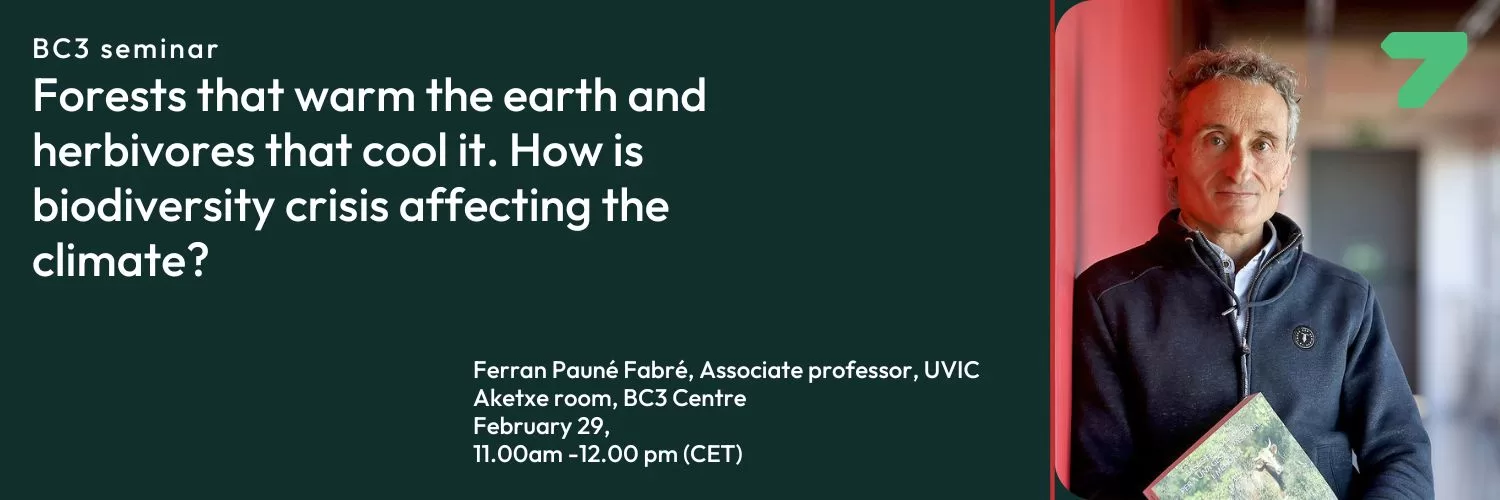
- This event has passed.
Forests that warm the earth and herbivores that cool it. How is biodiversity crisis affecting the climate?
February 29, 2024 @ 11:00 am - 12:00 pm
Event Navigation

The biodiversity and global fire crisis have become a major concern. In the Mediterranean, woody vegetation has historically been grazed. To test the use of extensive livestock as a tool for changing the structure and composition of vegetation, we reintroduced herds in afforested areas. The results in floristic composition, biomass, and herbivory intensity, revealed the connection between the structure of the herbaceous and shrub strata. Afforestation leads to impoverished forest communities. Herbivores increase biodiversity and reduce fuel load, but also reduce flammability through structural changes in vegetation, water content and species composition. I conclude that certain habitats have been described in a state of abandonment and, therefore, are not characteristic but the result of change in biocenosis. I postulate that herbivore disappearance during the Holocene and Anthropocene is one of the underlying causes for ecosystems to switch from herbivory to fire dominance. Here, I discuss the coevolution of herbivores and open woody vegetation, and the function of herbivory in climate regulation.
About the lecturer
Ferran Pauné Fabré completed a PhD in 2021 researching ecological patterns and processes in rangeland ecology, including theoretical and applied approaches. Since high school he focused his research interest on cave ecology, including troglobites (Zoology Museum of Barcelona), bats ecology (Universitat de Barcelona, UB), palaeontology and cave climatology (Spanish National Research Council, CSIC), 1985-1995). From his interest in the interaction between bats, pests, and pesticides, he conducted his bachelor’s Agronomist Degree Final Project at CSIC where he delved into the study of organic pollutants in several environmental matrices (1989-1998) with gas chromatography and mass spectrometry. During his undergraduate studies in biology, he contributed to other projects, such as the Herpetological Atlas of Catalonia, based on the database collected in his field notebook (UB, 1981-1991).
Since finishing Pauné MSc in 2000, he had been working on my PhD field work and in a series of projects related to rangeland management and planning for environmental services providing and biodiversity conservation. He has done a wide range of fieldwork amongst pastoralist local communities and vegetation in the Mediterranean, integrating the human ecology, economy, and Global Change dimensions (global fire and biodiversity crisis). He values the human development and he studied psychological approaches (2000-2017), by which he attempts to find out the causes of failure of conservation and sustainability policies. Pauné’s interest in the transfer of knowledge, led him to work with local communities in the creation of the Catalan Rangeland Alliance, a co-operative Governance of Public-Citizen Partnerships.
Sede Building (Room Aketxe), Scientific Park of the University of the Basque Country, February 29 (2024), 11:00am-12:00pm
In case you are interested in attending the seminar, please complete the following registration form.
Limited registration until full capacity.
This form is disabled.
